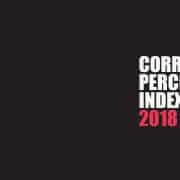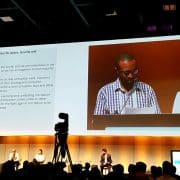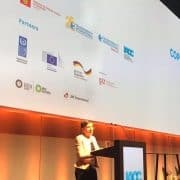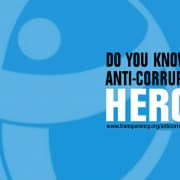|
Getting your Trinity Audio player ready...
|
Nominations are now open for the 2018 Transparency International (TI) Anti-Corruption Award. Known between 2000 and 2016 as the TI Integrity Award, it recognises the courage and determination of the many remarkable individuals – journalists, public prosecutors, government officials, civil society activists, and more – and organisations fighting corruption around the world.
The award may be conferred on a person or organisation discharging official or professional duties, as well as to an activist(s) from all walks of life.
Self-nominations will not be accepted. Wherever possible, nominations should be supported by the appropriate TI chapter – if the chapter is not involved at the nomination stage, it will be asked to help evaluate the nomination once the committee has received it.
Nominations will close on 15 July 2018 – make sure you’ve submitted your nomination before then. Visit the TI Anti-Corruption Award website for the online nomination form. Alternatively, you may email your nomination to anticorruptionawards@transparency.org.
The award committee may choose either one or two winners. In making these awards, the committee will take into consideration the need to recognise efforts in diverse fields of civil society, the private sector and government, and to acknowledge anti-corruption initiatives throughout the world.
The award consists of a trophy and participation in a public award ceremony to be held during the 18th International Anti-Corruption Conference in Copenhagen, Denmark, in October 2018.
Selection criteria
Selection is based on three general themes relating to the work of the nominee – impact, courage, and sustainability – with questions In considering nominations, the Anti-Corruption Award Committee also looks for geographical and occupational balance.
IMPACT: The recipient’s actions must be likely to significantly influence, or to have had a significant impact on, existing levels of corruption in their respective country or region. The work should also demonstrate that fighting corruption is possible and can have a positive impact on society and the public good. Furthermore, the recipient should be working in a country or region in which open society is at threat, and their anti-corruption work should involve as many people as possible while striving to ensure that society does not falter. The award should enhances the recipient’s profile and protects them from future threats.
COURAGE: The recipient’s actions must be particularly courageous and exemplary, inspirational and deserving of wide international recognition. It should be significant enough to attract interest and inspire emulation in other parts of the world.
SUSTAINABILITY: The action should recognise the longevity of commitment to fighting corruption, and should have contributed to or built resilient anti-corruption institutions, as well as adding to the durability and strength of the anti-corruption effort.
Eligibility
Nominees must meet the following requirements:
- Nominees must have undertaken an action that is likely to significantly influence, or to have had a significant impact on, existing levels of corruption in his/her respective country or region.
- The action should be one likely to attract interest and emulation in other parts of the world.
- The action must be particularly courageous and exemplary, inspirational and deserving of wide international recognition.
- The action should recognise the longevity of commitment to fighting corruption.
- Nominations for posthumous awards can be considered by the Committee only in truly exceptional cases.
Ineligible Nominees
The following categories of nominees will not be considered for the Anti-Corruption Award:
- Individuals or organisations of questionable integrity or goals.
- Members of the TI Board of Directors, the Boards of TI chapters, the Award Committee and salaried staff of the TI Secretariat and of chapters while serving in those capacities.
- Individuals or organisations that submit self-nominations.
Previous winners
2016
2014
2013
- Rafael Marques de Morais, journalist and human rights activist – Angola
- Luo Changping: journalist – China
2011
2010
- Grégory Ngbwa Mintsa: citizen – Gabon
- Sergei Magnitsky: tax lawyer – Russia (Posthumous)
- Attotage Prema Jayantha: investigative journalist – Sri Lanka
2009
2007
2006
- Dr. Ana Cecilia Magallanes Cortez: prosecutor – Peru
- Khairiansyah Salman: auditor – Indonesia
- The Movement for Quality Government government watchdog – Israel
- Abdou Latif Coulibaly: journalist – Senegal
2004
- Constable Naftali Lagat, police officer and David Munyakei, former clerk at Central Bank – Kenya
- Dr Milica Bisic: former head of the Tax Administration in Republika Srpska – Bosnia and Herzegovina
- Hasan Balikçi: electrical engineer – Turkey (Posthumous)
- Satyendra Kumar Dubey: public servant – India (Posthumous)
- Manik Chandra Saha: journalist and activist – Bangladesh (Posthumous)
2003
- Sua Rimoni Ah Chong: former controller and chief auditor of Samoa – Samoa
- Dr. Dora Akunyili: director-general of Nigeria’s National Agency for Food and Drug Administration and Control – Nigeria
- Ana Hazare: anti-corruption campaigner – India
- António Siba-Siba Macuácua: banker – Mozambique (Posthumous)
- Abdelhaï Beliardouh: journalist – Algeria (Posthumous)
2002
- Luis Roberto Mesquita: businessman – Brazil
- Peter Schönhöfer: pharmacologist – Germany
- Jana Dubovcová: district court chief justice – Slovak Republic
2001
- Eva Joly: investigating magistrate – France
- The Public Prosecutor’s Office and the People of the City of Londrina – Brazil
- Carlos Alberto Cardoso: journalist – Mozambique (Posthumous)
- Dr. Luis Carlos Galán Sarmiento: politician – Colombia (Posthumous)
- Georgy Gongadze: journalist – Ukraine (Posthumous)
2000








